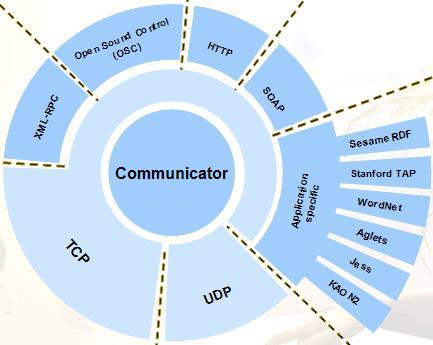You always have to run AMICO communicator. Other modules are loaded as
necessary. For example, if you want to control VLC Player through OSC messages
sent from you applications, that you need to run the
communicator, the
OSC interface (to receive messages
from your application), and HTTP/URL interface
(to call VLC player functions through its HTTP server). You can use
AMICO process runner to run all
these processes at once.
| Core module |
How to run |
Description |
| Communicator (Details) |
java -jar %AMICO_HOME%/bin/amico.jar [<conf-url>] |
The basic module. It implements basic AMICO TCP and UDP
interfaces, and provides variable exchange, derivation, and maintenance
services. It includes built-in variable derivation XSLT processor. |
| XML-RPC Interface (Details) |
java -jar %AMICO_HOME%/bin/amico-xml-rpc.jar [<conf-url>] |
An XML-RPC interface to AMICO. It runs and XML-RPC server, enabling
other modules to update and read variables, and in also enables definition of
XML-RPC adapters, that map variables from the communicator to method
calls on other XML-RPC servers. Implementation based on the
Apache XML-RPC library. |
| OSC Interface (Details) |
java -jar %AMICO_HOME%/bin/amico-opensound.jar [<conf-url>] |
An
OpenSound Control (OSC) interface to AMICO. It runs and OSC server,
enabling other modules to update and delete variables, and in also enables
definition of OSC adapters, that map variables from the communicator to
messages sent to other OSC servers. Implementation based on the
NetUtil library library. |
| HTTP Interface (Details) |
java -jar %AMICO_HOME%/bin/amico-url.jar [<conf-url>] |
A Unified Resource Locator (URL) interface to AMICO. It runs a Web server,
enabling other modules to used AMICO commands using HTTP GET request, and in also enables definition of
URL adapters, that map variables from the communicator to URLs that are then
opened, returned content can optionally be placed in a variable. |
| SQL Interface (Details) |
java -jar %AMICO_HOME%/bin/amico-sql.jar [<conf-url>] |
A
SQL database interface to AMICO. Enables usage of any JDBC or ODBC
compliant database (such as MySQL, MonetDB, Oracle, SQL Server, MS
Access...). Provides mapping of AMICO variables to any SQL query (INSERT,
SELECT, CREATE, DROP...), and update of AMICO variables with the results of
these queries. |
| XML Processor (Details) |
java -jar %AMICO_HOME%/bin/amico-xml-processor.jar
[<xml-variable>] [<xml-variable-type>] [<status-variable>]
[<xml-adapter-url>] [<comm-host>] [<comm-port>] |
Some of the variables in communicator can
contain XML or HTML encoded text, or links to such documents. XML Processor
derives new variables from such variables using
XPath expressions or
XSL transformations. |
| SOAP Interface (Details) |
java -jar %AMICO_HOME%/bin/amico-soap.jar [<config-url>] |
An
SOAP interface to AMICO. In
enables definition of SOAP adapters, that map variables from the
communicator to invocation of SOAP services. Implementation based on
Apache Axis2. |
| REST Interface |
Available soon... |
An
REST interface to AMICO.
More details available soon... |
| CORBA Interface |
Available soon... |
An
CORBA interface to AMICO.
More details available soon... |
| Dynamics module |
How to run |
Description |
| AMICO Event Handler (Details) |
java -jar %AMICO_HOME%/bin/amico-event-handler.jar [<config-url>] |
Simple response to changes of AMICO
variables. |
| AMICO State Machine (Details) |
java -jar %AMICO_HOME%/bin/amico-state-machine.jar [<config-url>] |
Implementation of a finite state machine (FSM)
or finite state automaton, a model of behavior composed of states,
transitions and actions. A state, represented by AMICO variables, stores
information about the past, i.e. it reflects the input changes from the
system start to the present moment. A transition indicates a state change
and is described by a condition that would need to be fulfilled to enable
the transition. An action is a description of an activity that is to be
performed at a given moment. |
| Time Processor |
Available Soon... |
Provides derivation of new variables based on
time setting. Include functions such as timers, delay, frequency filters,
and window based averaging. |
| Auxiliary module |
How to run |
Description |
| Process Runner (Details) |
java -jar %AMICO_HOME%/bin/amico-process-runner.jar [<conf-url>] |
Runs a group of program. As many of AMICO
modules are implemented as standalone (Java) applications, it is convenient
to have a program that can run at once all the modules that are necessary
for some scenario. |
| Simulator (Details) |
java -jar %AMICO_HOME%/bin/amico-simulator.jar [<conf-url>] |
Enable execution of configurable simulations.
Supports single commands, as well as simple command loops. |
| Validator (Details) |
java -jar %AMICO_HOME%/bin/amico-validator.jar [<conf-url>] |
Check sequence and format of messages
exchanged through communicator. |
| Generic Commander (Details) |
java -jar %AMICO_HOME%/bin/amico-utils-generic-commander.jar |
Provides simple interface where you can
directly type commands from the AMICO
TCP protocol. |
